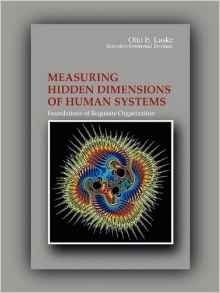This blog introduces the new IDM Program for learning complexity thinking based on critical problems brought forward by the client. Client-proposed problems serve as a procedural and behavioral guideline for a 5-step acquisition of cutting-edge solution approaches that have been tested in previous IDM teaching and are grounded in Roy Bhaskar’s work on dialectic (1993). In contrast to earlier IDM offerings, the present one progresses in clear steps from module to module to facilitate learner progress. Emphasis in the course is put on “doing” over passive listening. Lecturing is kept to a minimum. A progressive sequence of mandatory "meta-thinking" exercises is in place. The program comprises 5 steps taking 9 months to 1 year to complete, depending on the learner’s present level of cognitive development and mental habits. It concludes with three successively higher-level certifications in complexity thinking for use in life and work. Course materials are module-specific and are enriched by IDM publications on sale at www.interdevelopmentals.org under Publications, or taken from recent blogs by Otto Laske. A discount applies to registering for 4 of the 5 modules upfront, after writing to otto@interdevelopmentals.org to discuss the learner's agenda. In coming months, the program will move from its present test-phase... Read More...
Tag: thinking
A New Approach to Dialog: Teaching the Dialectical Thought Form Framework (DTF)
Can you imagine being part of a dialog in which you not only listen to what your interlocutor is saying but also to the underlying structure of his or her thinking? If you had knowledge of the thought form structure of human sense making, this way of listening, called “dialectical”, would enable you to point to what is missing (absent) both in your own and others’ verbal communication. It would thereby help you deepen your and others' thinking in real-time dialog. Your critical listening would then not be restricted to content but would equally focus on underlying thought structures used by your interlocutors. In a team and group context, you would be able to point to interlocutors’ thought gaps in a compassionate, inter-developmental, way. Such gaps are not “academic”. They are more serious than that since they translate into gaps between how people think and how reality works. It is this kind of dialog that the present article introduces. The article paves the way for an intelligent reading and teaching of the Manual of Dialectical Thought Forms (DTFM), which in the near future will become available in pdf form on this website under Publications. The article introduces cutting-edge thinking tools... Read More...
Nick Shannon on “What Can IDM Offer the Integral Movement?”
In this article, written in response to the 2nd ITC conference (2010), Nick Shannon outlined four main vantage points from which teachings at the Otto Laske Interdevelopmental Institute (IDM) elucidate and strengthen integral thinking: (1) upper left quadrant, (2) dialectical unfolding of concepts, (3) moving from contextual to transformation language, and (4) cognitive development and higher levels of consciousness. Shannon thought that in all of these regards, Otto Laske's teaching clarifies and advances integral thinking. To this day, the promise of this teaching, more recently reinforced by Bhaskar's dialectical writings (1990s), has remained largely unknown or unnoticed. We are reprinting N. Shannon's thoughts here to invite further engagement of integral practitioners with dialectic, a recent topic of Laske's book entitled "Dialectical thinking for integral leaders: A primer" (Integral Publishers, 2015). Shannon, What can IDM offer the Integral Movement Read More...
CDF Works on Many Levels
In this short post, I want to draw attention to the fact that what we call CDF -- short for Constructive Developmental Framework (see Wiki) -- is a multilevel methodology, not only a methodology comprising three interrelated modules. What I mean by that is that a CDF user can use this methodology on at least four levels if not more: 1. The real-time interviewing and assessment level 2. The scoring, interpretation, and feedback level 3. The role design level 4. The human-capital level where CDF is a decision theory, both practical and teachable, regarding what is the requisite match between contributors' developmental profile (size of person) and their accountability level (size of role). Up to now, CDF has mainly been taught at the first two levels, under the label of "case studies". These are focused on individual contributors and team members. Jan De Visch has developed theories about the role design level, spelled out in his two books, especially in "Minds Creating Value" (2014, see www.connecttransform.be). I find level 1 highly important because at this level CDF functions in real-time, and what it un-earthes through interviews are DTF generative mechanisms creating movements-in- thought. This is the level of dialog, and... Read More...
From “Developmental Theory” to a Dialogical and Dialectical Epistemology
By Otto Laske - In this text, I focus on the central relevance of interviewing skills for being able to lead a structured developmental dialog in the sense of the Constructive Developmental Framework (CDF), whether social-emotional or cognitive. I want to make it clear that the certification as a Master Developmental Consultant/Coach at the Interdevelopmental Institute (IDM) is not a certification in practicing “developmental theory”, but rather an independent discipline derived from it, namely, a dialogical and dialectical epistemology. Developmental theory per se is taught at IDM only in applied courses which serve as a basis for learning the CDF epistemology, and in this sense are mere teasers for learning to think and listen developmentally, dialogically, and dialectically. What matters is not the theory, but its applications in work with human resources (“human capital”). This has always been the focus of IDM teaching. Abbreviations: CDF = Constructive Developmental Framework (Laske); DCR = Dialectical Critical Realism (Bhaskar); DSF = Dialectical Schema Framework (Basseches); DTF = Dialectical Thought Form Framework (Laske); IDM = Interdevelopmental Institute (Laske). *** When I started writing my two books on Measuring Hidden Dimensions in 2005, it was clear to me that the most progressive part of Kegan’s... Read More...
